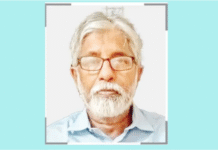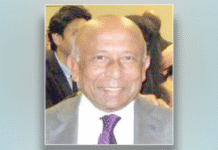The authorities in Naypyidaw are steering the former authoritarian pariah state to open engagement with the world. Well, that is what they say, write Laura Haigh and Olof Blomqvist
This week, Myanmar is in the spotlight as world leaders — including the US president, Barack Obama, and his Chinese counterpart, Xi Jinping — descend on the country for two key regional summits, the East Asia Summit and that of the Association of Southeast Asian Nations (ASEAN).
The foreign dignitaries will gather in Naypyidaw, the country’s capital and seat of government since the then-military rulers moved it there from Yangon in 2005. It is a remarkable turn of events for a country that just over three years ago was considered an international pariah, politically and economically isolated from most of the rest of the world. But since the transition from military rule started in 2011, international acceptance has come quickly. This week is Myanmar’s chance to show the world that it is a new country that has turned a corner on human rights and is very much open for business.
Scratch the surface just a little, however, and the flaws in this narrative become all too apparent. Far from a country transformed, Myanmar continues to face a catalogue of human-rights concerns which the authorities seem unwilling or unable to tackle. It may be convenient for the international community, eager to engage with the resource-rich country, to take at face value the government’s talk of having turned the corner on human rights. But reality on the ground tells a very different story.
Rohingya
Some 300 kilometres west of Naypyidaw is Rakhine state, home to most of Myanmar’s Muslim Rohingya minority — a community which has faced institutionalised discrimination for decades.
In June 2012, religious tensions erupted into vicious violence between the state’s Buddhists and Muslims, disproportionately affecting the latter. Clashes have continued sporadically since and spread to other parts of the country, leaving more than 200 people dead.
Yet there has been no independent or credible investigation into any of this violence. Serious allegations that security forces took part in attacks or failed to protect those targeted have gone uninvestigated. Instead, Muslims continue to be disproportionately picked on for arrest.
The violence has forced tens of thousands of mainly Rohingya to flee their homes. Almost 140,000 men, women and children live in official camps for internally displaced people (IDP) or informal settlements around Rakhine. They face a growing humanitarian crisis in often appalling conditions, without sustained access to necessities like food or medicine.
The situation has grown even more desperate since February and March, when a number of humanitarian organisations and international aid agencies were forced out of Rakhine. Long considered by many locals as biased towards the Rohingya, some organisations faced attacks and others chose to leave, fearing they couldn’t guarantee the safety of their operations. Although many of them have begun to return, operations are still below par. Following a visit in July, one senior UN official described witnessing ‘a level of human suffering in IDP camps that I have personally never seen before’.
The anti-Muslim violence has to be seen in a broader context of discriminatory laws and policies towards the Rohingya. Often disparaged as ‘Bengali settlers’, they are denied citizenship under Myanmar’s 1982 Citizenship Law, which effectively renders them stateless. They face severe restrictions on their freedom of movement and access to basic services.
But despite repeated calls by human-rights organisations to grant the Rohingya full citizenship, recent moves by the government seem designed to cement their exclusion still further. A deeply flawed national census in March did not allow members of the community to identify themselves as ‘Rohingya’ but forced them to use the term ‘Bengali’, widely considered derogatory. As a result most Rohingya were not enumerated.
In October, a draft of the government’s Rakhine State Action Plan was leaked. The draft plan looks set to entrench and expand discriminatory laws and policies if implemented. The Rohingya would effectively be left with a choice to accept second-class citizenship — revocable at any time — or risk being housed in detention camps ahead of possible deportation. The leaked plan appears to have triggered a new wave of people fleeing the Bay of Bengal in boats, adding to the more than 87,000 who have fled by sea since 2012, according to the UN.
It is crucial that world leaders in Naypyidaw this week do not leave the plight of the Rohingya off the table. They must continue to push the Myanmar authorities to end the entrenched discrimination and violence the community faces.
Backsliding
It is equally crucial, however, that they acknowledge that this is far from the only human-rights issue still facing the country. In fact, despite some initial promise after the political transition started in 2011, the past year has seen alarming backsliding. Myanmar’s opposition leader, Aung San Suu Kyi, said as much herself last week, when in pointed and carefully timed remarks she called the reform process ‘stalled’.
There is much evidence to suggest that, while the authorities are keen to reap the financial benefits of opening up to the world, they are not willing to deal with the increasing demands for basic freedoms that come with it. Too often, they have resorted to familiar tactics: repression and arrests.
In June 2013, the president, Thein Sein, pledged to release all prisoners of conscience by the end of the year. But despite some highly publicised amnesties — often timed to occur when the authorities need to show their best face to the world — this promise remains far from fulfilled. Scores of peaceful activists still languish in prison and the arrest of dissidents has actually picked up pace this year. Land-rights and political activists, human-rights defenders and journalists are just some of those who have been targeted, harassed and imprisoned.
One of those still behind bars is Tun Aung, a Rohingya community leader and medical doctor. His ‘crime’ was to try to calm the crowd during a riot between Buddhists and Rohingya Muslims in Maungdaw, western Myanmar, in June 2012. He has since received multiple prison sentences under various charges after manifestly unfair trials, and is facing at least another year behind bars. Amnesty International has named him a prisoner of conscience and continues to campaign for his release.
These latest arrests and the continuing suppression of dissent are underpinned by draconian laws. The Peaceful Assembly and Peaceful Procession Law, for instance, places far-reaching restrictions on the rights to freedom of expression and peaceful assembly, and is often used to target peaceful activists and human-rights defenders. As long as such laws remain on the books, arrests and repression will continue, and the country’s jails will remain full of prisoners of conscience.
Abuses
Myanmar has also for decades faced armed conflicts in some of its ethnic-minority regions. Although these have subsided in recent years, fighting continues mainly in Northern Shan and Kachin states, undermining attempts to agree a nationwide ceasefire. Although tens of thousands of civilians are displaced in both cases, the government continues to deny unimpeded access to aid groups, allowing only periodic, short-term missions from safer areas. Reports of human-rights abuses on all sides continue to flood in, including unlawful killings, torture, rape and other forms of sexual violence.
At the same time, Myanmar’s deeply flawed criminal-justice system embeds impunity for human-rights violations. Trials rarely meet international standards, the corrupt judiciary is susceptible to bribes and brave lawyers or judges who try to take a stand lack almost any protection against reprisals — including revocation of licenses, threats and discrimination. Reports of torture in police detention are rife, yet those responsible are rarely, if ever, held to account.
The political transition which started in Myanmar some three years ago triggered enormous hope and expectation. Disillusionment has set in but it is not too late for a change of course. This week offers an opportunity for world leaders to make sure Myanmar’s government really re-engages on human rights — as distinct from spinning a success story while letting grievances fester.
Source: Newage










